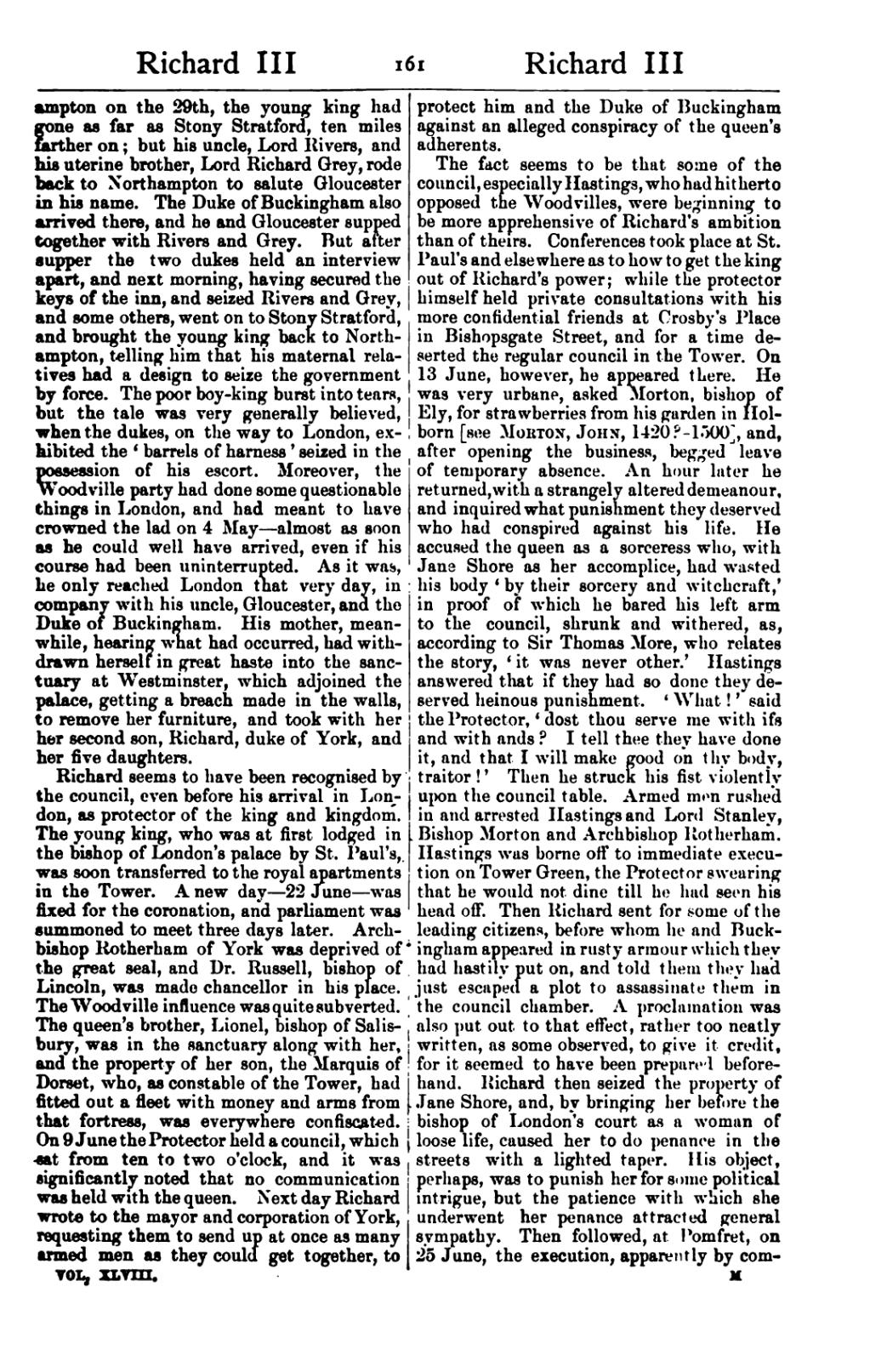ampton on the 29th, the young king had gone as far as Stony Stratford, ten miles farther on; but his uncle, Lord Rivers, and his uterine brother, Lord Richard Grey, rode back to Northampton to salute Gloucester in his name. The Duke of Buckingham also arrived there, and he and Gloucester supped together with Rivers and Grey. But after supper the two dukes held an interview apart, and next morning, having secured the keys of the inn, and seized Rivers and Grey, and some others, went on to Stony Stratford, and brought the young king back to Northampton, telling him that his maternal relatives had a design to seize the government by force. The poor boy-king burst into tears, but the tale was very generally believed, when the dukes, on the way to London, exhibited the ‘barrels of harness’ seized in the possession of his escort. Moreover, the Woodville party had done some questionable things in London, and had meant to have crowned the lad on 4 May—almost as soon as he could well have arrived, even if his course had been uninterrupted. As it was, he only reached London that very day, in company with his uncle, Gloucester, and the Duke of Buckingham. His mother, meanwhile, hearing what had occurred, had withdrawn herself in great haste into the sanctuary at Westminster, which adjoined the palace, getting a breach made in the walls, to remove her furniture, and took with her her second son, Richard, duke of York, and her five daughters.
Richard seems to have been recognised by the council, even before his arrival in London, as protector of the king and kingdom. The young king, who was at first lodged in the bishop of London's palace by St. Paul's, was soon transferred to the royal apartments in the Tower. A new day—22 June—was fixed for the coronation, and parliament was summoned to meet three days later. Archbishop Rotherham of York was deprived of the great seal, and Dr. Russell, bishop of Lincoln, was made chancellor in his place. The Woodville influence was quite subverted. The queen's brother, Lionel, bishop of Salisbury, was in the sanctuary along with her, and the property of her son, the Marquis of Dorset, who, as constable of the Tower, had fitted out a fleet with money and arms from that fortress, was everywhere confiscated. On 9 June the Protector held a council, which sat from ten to two o'clock, and it was significantly noted that no communication was held with the queen. Next day Richard wrote to the mayor and corporation of York, requesting them to send up at once as many armed men as they could get together, to protect him and the Duke of Buckingham against an alleged conspiracy of the queen's adherents.
The fact seems to be that some of the council, especially Hastings, who had hitherto opposed the Woodvilles, were beginning to be more apprehensive of Richard's ambition than of theirs. Conferences took place at St. Paul's and elsewhere as to how to get the king out of Richard's power; while the protector himself held private consultations with his more confidential friends at Crosby's Place in Bishopsgate Street, and for a time deserted the regular council in the Tower. On 13 June, however, he appeared there. He was very urbane, asked Morton, bishop of Ely, for strawberries from his garden in Holborn [see Morton, John, 1420?–1500], and, after opening the business, begged leave of temporary absence. An hour later he returned, with a strangely altered demeanour, and inquired what punishment they deserved who had conspired against his life. He accused the queen as a sorceress who, with Jane Shore as her accomplice, had wasted his body ‘by their sorcery and witchcraft,’ in proof of which he bared his left arm to the council, shrunk and withered, as, according to Sir Thomas More, who relates the story, ‘it was never other.’ Hastings answered that if they had so done they deserved heinous punishment. ‘What!’ said the Protector, ‘dost thou serve me with ifs and with ands? I tell thee they have done it, and that I will make good on thy body, traitor!’ Then he struck his fist violently upon the council table. Armed men rushed in and arrested Hastings and Lord Stanley, Bishop Morton and Archbishop Rotherham. Hastings was borne off to immediate execution on Tower Green, the Protector swearing that he would not dine till he had seen his head off. Then Richard sent for some of the leading citizens, before whom he and Buckingham appeared in rusty armour which they had hastily put on, and told them they had just escaped a plot to assassinate them in the council chamber. A proclamation was also put out to that effect, rather too neatly written, as some observed, to give it credit, for it seemed to have been prepared beforehand. Richard then seized the property of Jane Shore, and, by bringing her before the bishop of London's court as a woman of loose life, caused her to do penance in the streets with a lighted taper. His object, perhaps, was to punish her for some political intrigue, but the patience with which she underwent her penance attracted general sympathy. Then followed, at Pomfret, on 25 June, the execution, apparently by com-
